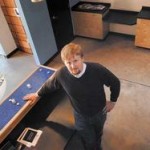Some books for your reading list
I gave a talk at Rollins to an MBA class about Technological Entrepreneurship, taught by a friend of mine. The bulk of it was about how I have brought my career to where it is, and the things I use to sell myself.
Three things I spent some time talking about were:
- Open Source Software: my latest mantra here is that people are putting in hundreds, thousands or millions of hours into creating this software, and you don't have to pay a penny. You can also potentially benefit from each person who uses it - that doesn't happen with commercial software, except in the very best of companies with the very best feedback systems. Even then, you may never meet many people who use the same proprietary software as you. Finding others in the Open Source world is as easy as email, IRC, Google, and a hundred other technologies that also don't cost you anything. I've been able to build all my business in the last 5 years on the back of Drupal, and people build huge companies on the same platform.
- Podcasting and Blogging: For the amount that a podcast costs me to produce (only my time), I have gotten a lot of my business by giving away what I know. The thing is not what you know, but how you are able to teach yourself new things, and keep your finger on the pulse - watch trends, do research, experiment, and discover.
- In-Person Involvement and Meetups: Just the fact that I am involved with Urban ReThink, Florida Creatives, the Florida DrupalCamp and BarCampOrlando has helped me build a reputation I could not imagine. At the same time, the "Long Tail" involvement I have with communities - the ones where I have a smaller impact, but am nonetheless important - simply because I am there - those are some places where I become even more well-connected. Take poetry, Film, Art, Theatre or Music as examples of communities where I don't show up often, but often enough to be known.
- Perhaps most importantly, I have a strong group of advisers, mentors, and peers who I can bounce ideas off of, and vice versa. We can talk about things I would not be comfortable discussing with others, and I generally tell them things it would be hard to tell others, because they are not as invested in my career, with the same level of understanding of how I come to evangelize ideas. These people are an absolutely indispensable part of my world.
It may seem like I am patting myself on the back, but that is really the mindset I had to have to put together this lecture. If I am able to call myself a success in my own right, how did I get here?
In the last few minutes of the talk, I decided to put together a list of books I thought the class members would be interested in. These books really helped me get where I am now, and help me to make hard decisions all the time.
- Small Giants
- Bo Burlingham
- The Starfish and the Spider
- Rod Beckstrom, Ori Brafman
- The Whuffie Factor
- Tara Hunt
- MTIV: Process, Inspiration and Practice for the New Media Designer
- Hillman Curtis
- The Power of Pull
- John Hagel III, John Seely Brown, Lang Davison
- Universal Principles of Design
- William Lidwell
- Free Agent Nation
, A Whole New Mind
- Daniel H. Pink
- The Long Tail
, Free
- Chris Anderson
- Innovation and Entrepreneurship
- Peter F. Drucker
Commenting on this Blog post is closed.

